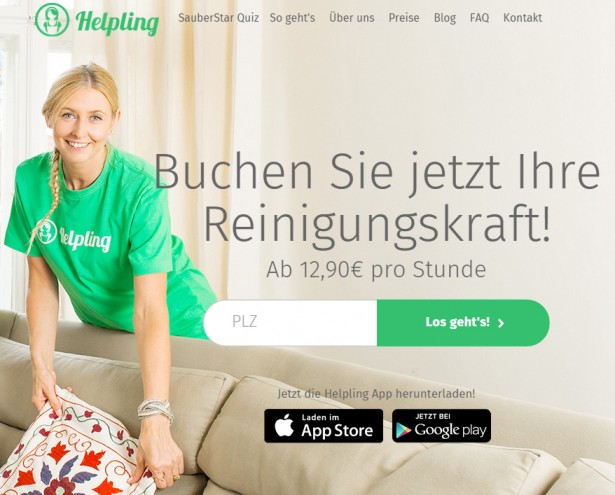Moving forward, Helpling will do for home cleaning what Uber did for ride-sharing and what Airbnb did for room-sharing, says the Berlin-based Rocket Internet in regards to its on-demand cleaning service.
The company announced that it has raised $16.8 million from investors in its latest round of Series A funding as part of its efforts to compete on an international level and seek out new territories. It received funding from Mangrove Capital, Phenomen Ventures, Point Nine Capital and Delivery Hero chairman Lukasz Gadowski.
The start-up, which had an initial funding target of $25 million, has already proven to be rather successful as it was launched in Berlin this past March and has already expanded into 150 cities in seven countries across Europe and South America. Rocket Internet has also helped other e-commerce ventures that have facilitated immense success – African start-up Jumia raised $120 million last week and Lazada garnered $250 million over the weekend.
It remains unclear if the value was disputed between the company and investors, or why Rocket Internet didn’t take part in the funding round, or how the money will be spent and invested. With that being said, Helpling isn’t also releasing any specific regarding how many boots are on the ground and how many cleaners have assignments each day.

“We normally establish a local office with about two handful (of) employees. Launching in a city means that we have at least one handful of vetted cleaners,” said Helpling founder Benedikt Franke in an interview with TechCrunch. “They have successfully gone through our multistep application process including a personal (telephone) interview, a cleaning test, submission of documents/papers (such as a criminal record, business license and references in Germany).”
Although Helpling is competing with the likes of Google-backed Homejoy, TaskRabbit and Direct Cleaner, the company’s largest could very well be the underground economy where domestic cleaning services dominate in various countries around the world. However, due to their black market operations, where a lot of cleaning jobs are paid under the counter, they can’t use government resources to shut them down akin to what the hotel industry has been doing to Airbnb and what the taxi industry has been doing to Uber.
“In general, Germans like to follow the rules,” Franke told Reuters. “Yet 90 percent of domestic cleaning work in Germany happens on the black market. We offer a legal way for the two sides to do business together.”
With the peer-to-peer marketplace growing exponentially, it should be interesting what actions governments around the world take.
And while Helpling doesn’t reveal how the money will be spent, or give any indication as to its customer numbers or total roster of cleaners, co-founder Philip Huffmann said the company, and by association its rivals too, are tapping the collaborative consumption model to make cleaning services a reality for all for the first time.
“Home Cleaning used to be for a relatively niche audience. Adding flexibility, convenience and security at competitive prices enables more people than ever to benefit from these services. We want to give people more free time and an ever more enjoyable experience at home,” he said in a statement.



